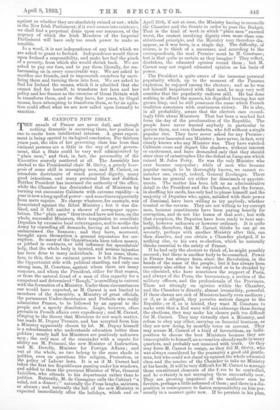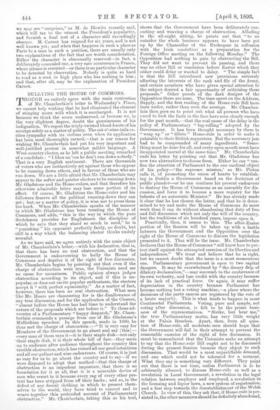M. CARNOT'S NEW ESSAY.
THE annals of France are never dull, and though nothing dramatic is occurring there, her position is one to excite keen intellectual interest. A great experi- ment is being carried to its logical conclusion. For thirteen years past, the idea of her governing class has been that eminent persons are a little in the way of good govern- ment, that a State could be very well administered by " plain men," and that, in fact, the personality of the Executive scarcely mattered at all. The Assembly has elected to the Presidential chair M. Gr&ry, a greedy bour- geois of some skill in managing men, and M. Carnot, an irresolute doctrinaire of much personal dignity, many good intentions, and many personal likes and dislikes. Neither President has increased the authority of the office, while the Chamber has diminished that of Ministers by turning out successive Cabinets with extreme rapidity—a year is now along spell of power—and sometimes apparently from mere caprice. No charge whatever, for example, was formulated against the Ribot Ministry ; but it was dis- liked, and it fell amidst a shower of newspaper oppro- brium. The " plain men " thus treated have not been, on the whole, successful Ministers, their temptation to conciliate Deputies by excessive local extravagance, and to soothe the Army by conceding all demands, having at last seriously embarrassed the finances ; and they have, moreover, brought upon themselves a general reputation for cor- ruption, So many of the Opportunists have taken money, or jobbed in contracts, or sold influence for speculators' help, that the whole body is tainted, and serious injustice has been done to many individuals. It has come, there- fore, to this, that no eminent person is left in France on the Opportunist side with political standing, and only one strong man, M. Constans, against whom there are many rumours, and whom the President, either for that reason, or from the natural dread of a man of thin capacity for a competent and determined " Rough," is unwilling to entrust with the formation of a Ministry. Under these circumstances one would have expected, as M. Carnot is not limited to members of the Assembly, a Ministry of great officials, the permanent Under-Secretaries and Prefects who really administer France, to be followed by an appeal to the people and a speedy dissolution. Logic, however, often prevails in French affairs over expediency ; and M. Carnot, clinging to the theory that Ministers do not much matter, has made M. Dupuy Premier, and has accepted from him a Ministry apparently chosen by lot. M. Dupuy himself is a schoolmaster who understands education better than politics ; nearly half his Ministers are positively unknown men ; the only men of the remainder with a repute for ability are M. Poincar6, the new Minister of Instruction, and M. Develle, Minister for Foreign Affairs ; and out of the whole, no two belong to the same shade in politics, even on questions like religion, Protection, or the policy of Labour laws. It is as if M. Carnot had taken the first ten Republicans passing under his windows, and added to them the previous Minister of War, General Loizillon, who attends to his department rather than to politics. Naturally, M. de Cassagnac calls the Cabinet " a salad, not a dinner ; " naturally the Press laughs, satirises, or abuses ; and naturally the fall of the new Ministry is expected immediately after the holidays, which eud on April 25th, if not at once, the Ministry having to reconcile the Chamber and the Senate in order to pass the Budget. That is the kind of work in which " plain men" succeed worst, the contest involving dignity even more than con. stitutional principle, and the Ministry may therefore dis- appear, as it was born, in a single day. The difficulty, of course, is to think of a successor, and according to the correspondents, the next Premier must be M. Constans ; but is that quite as certain as they imagine ? They reflect, doubtless, the educated opinion round them ; but M. Carnot may not regard educated opinion as his basis of power. The President is quite aware of the immense personal popularity which, up to the moment of the Panama explosion, he enjoyed among the electors ; and as he was not himself bespattered with that mud, he may very well consider that the popularity endures still. He has done nothing to offend the masses, his dignified bearing has not grown limp, and he still possesses the name which French tradition associates with continuous victory. He is also, in all probability, aware that the electors care exceed. ingly little about Ministers. That has been a marked fact from the day of the proclamation of the Republic. The people have never wanted anybody in particular to govern them, not even Gambetta, who fell without a single popular riot. They have never asked for any Premier ; have never lamented any Minister ; have never, in fact, very clearly known who any Minister was. They have watched Cabinets come and depart like shadows, without interest or excitement, and have demanded only that they should steer clear of catastrophes like the defeat at Lang-son which ruined M. Jules Ferry. He was the only Minister who ever became unpopular ; while of men who became popular enough to be thoroughly known, we cannot re- member one, except, indeed, General Boulanger. There has been no general cry either for dismissals or appoint- ments. The matter has been left as an administrative detail to the President and the Chamber, and the former, in shuffling his cards, has only had to please himself and the majority of Deputies who, again, satisfied with their power of dismissal, have been willing to try anybody, whether trusted or the reverse. They are not willing to try corrupt men, because constituents have been paying heavily for corruption, and do not like losses of that sort ; but with that exception, the Deputies have been ready to bear any- body, however unknown or however ordinary. It is quite possible, therefore, that M. Carnot thinks he can go on serenely, perhaps with another Ministry after this, can then dissolve, and can obtain a Chamber pledged, if to nothing else, to his own re-election, which he naturally thinks essential to the safety of France. If he had only the electors to think of, he might possibly succeed ; but there is another body to be consulted. Power in France has always been, since the Revolution, in the hands of the mass of the people ; but it has always been necessary also either to be respected or to be dreaded by the educated, who have sometimes the support of Paris, and always of the Press, the bureaucracy, a section of the military officers, and the professionals of the Provinces.
These act strongly on opinion within the Chamber, and the Chamber is directly, almost irresistibly, powerful. If these classes are sick of Ministers hardly even mediocre ; or if, as is alleged, they perceive serious danger to the Republic ; or if, as is hinted, they want M. Constans to make sure that a Red wave will not submerge them during the elections, they may make his chosen path too difficult for M. Carnot. They may virtually elect a Ministry, and refuse to obey any other, carrying on financial business, as they are now doing, by monthly votes on account. They may accuse M. Carnot of a kind of favouritism, an indis- position to choose the best Ministers because they are unacceptable to himself, an accusation already made in many quarters, and probably not unmixed with truth. Or they may force M. Carnot to resign, as they did M. Gr&y, who was always considered by the peasantry a good old gentle- man, but who could not stand up against the whole educated class and the resolve of the Chamber to take no Ministry at his hands. It will be very difficult for M. Carnot to manage these constituent elements of the f...rce to be controlled, and he certainly is not managing them successfully now. They are growing impatient of the mediocre men he favours, perhaps a little ashamed of them ; and there is a dis- position in consequence to fasten responsibility on him per- sonally in a manner quite new. If he persists in his plan, we may see " surprises," as M. de Blowitz recently said, which will tax to the utmost the President's popularity, and furnish a final test of a character still exceedingly obscure. M. Carnot has reigned for six years, and is not well known yet ; and when that happens in such a place as Paris to a man in such a position, there are usually only two explanations of the fact that are worth consideration. Either the character is abnormally reserved—in fact, a deliberately concealed one, a very rare occurrence in France, where silence is resented—or there is no particular character to be detected by observation. Nobody is quite so hard to read as a man in high place who has nothing in him ; and that, after all, may be the explanation of President Carnot.



































 Previous page
Previous page